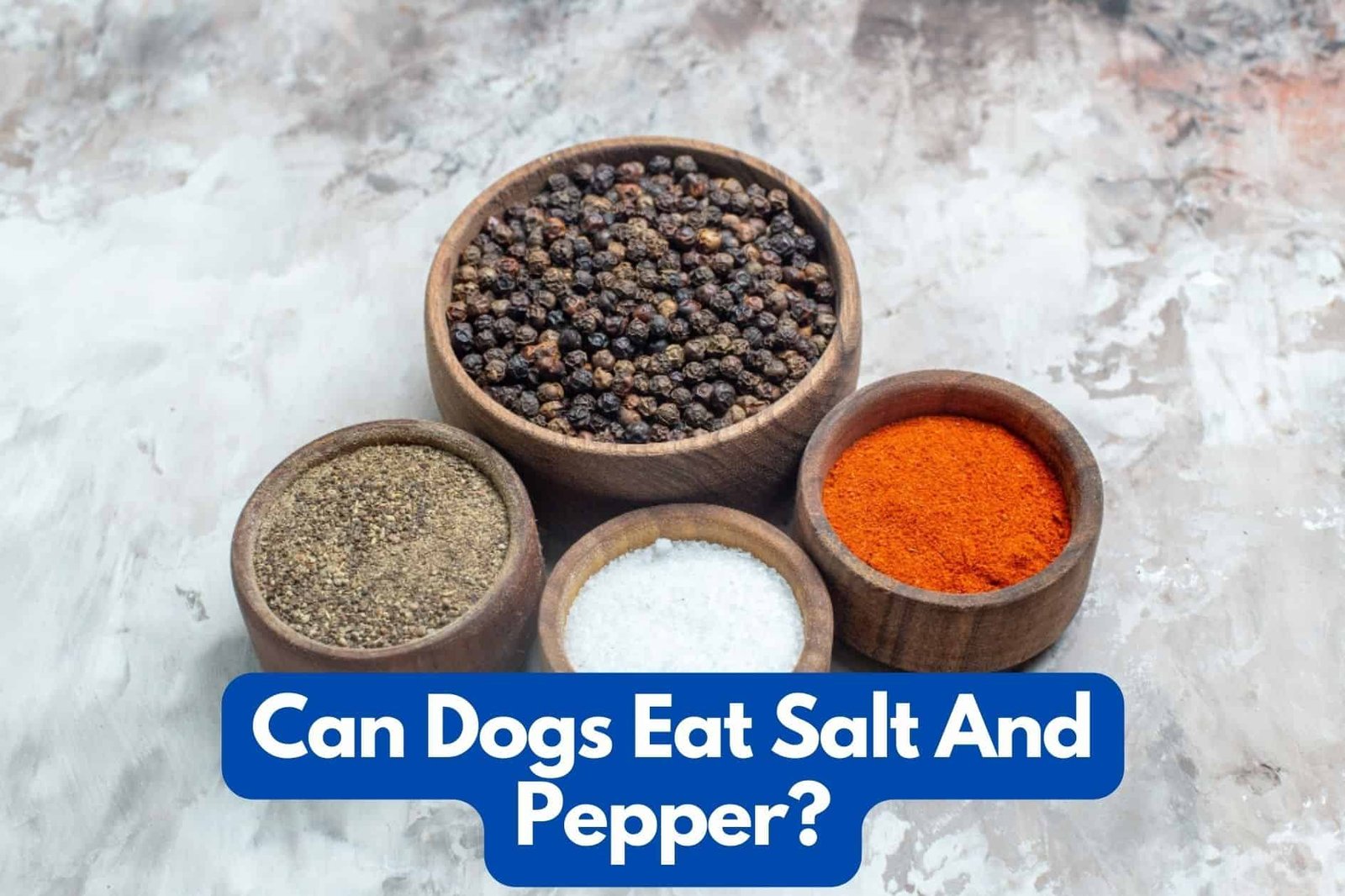Can Dogs Eat Salt And Pepper?

Have you ever wondered if it’s okay for your furry buddy to eat salt and black pepper? As a caring pet parent, knowing which foods are safe for your dog is essential. That’s why this helpful guide will explore whether dogs can safely enjoy salt and black pepper. We’ll talk about the possible risks, better alternatives, and ways to ensure your dog stays healthy and happy.
So, whether you’re curious or concerned, this article will provide you with valuable information to make informed choices about your dog’s diet and seasoning preferences. Keep reading to learn more about salt and black pepper, and how they affect our four-legged friends.
Can Dogs Eat Salt?
Yes, dogs can eat salt, but it should be in moderation. Salt is essential for various bodily functions in dogs, such as regulating fluid balance and aiding nerve impulses. However, excessive salt intake can be harmful. It can strain their kidneys and cardiovascular system, leading to health issues like high blood pressure and kidney problems.
If you are feeding your dogs commercial dog foods, then that is okay because they usually contain adequate sodium levels. Hence, you don’t need to add extra salt to your dog meals.
Monitoring their salt intake and avoiding salty treats or table scraps is important for their overall well-being. If you have concerns, consult your veterinarian for personalized advice regarding your dog’s specific needs.

How Much Salt Can I Give My Dog?
The recommended amount of salt for dogs is approximately 0.5 to 1.5 grams of salt per day for every 10 pounds of body weight. This roughly translates to about 1/8 to 1/4 teaspoon of salt per day for an average-sized dog.
It’s important to note that this is a general guideline, and individual dogs may have specific dietary needs or health conditions that require adjustments. Commercial dog foods usually contain sufficient sodium levels, so adding extra salt is usually unnecessary and can be harmful.
Do Dogs Need Salt In Their Diet?
Of course, dogs need salt in their diet as it is good and provides them with sodium which their body needs. However, you must only give dogs salt in moderation and not exceed 1.5 grams of salt in their meals.
The good news is that most commercial dog foods already contain the right amount of salt your dogs need. So, you don’t have to think too much about the quantity of salt in your dog’s meals. On the other hand, if you are feeding your dogs homemade dog food then you need to add very little or no salt at all.
What If My Dog Ate Salt, What Should I Do?
It is very unlikely that your dog will go about licking raw salt, so a near substitute will be to eat very salty food. So, if your dog has consumed salty food, there are a few steps you can take to help them.
- Firstly, observe their behavior and look out for signs of salt toxicity, such as excessive thirst, vomiting, or diarrhea.
- Provide them with plenty of fresh water to drink, as it will help flush out the excess salt from their system.
- It’s important not to induce vomiting without consulting a veterinarian first.
- Monitor their condition closely, and if you notice any severe symptoms or if you’re unsure about the amount of salt ingested, seek immediate veterinary attention. They may require medical treatment or supportive care to prevent complications.
- Remember, prevention is key, so keep salty foods out of reach from your furry friend to avoid such situations in the future.
What Are The Signs Of Salt Poisoning In Dogs
Signs of salt poisoning in dogs may include:
- Excessive thirst: Increased water intake beyond normal levels.
- Increased urination: Frequent or excessive urination.
- Vomiting: The dog may vomit or have episodes of retching.
- Diarrhea: Loose or watery stools.
- Lethargy: Unusual lack of energy or enthusiasm.
- Lack of appetite: Decreased interest in eating.
- Abnormal fluid retention: Swelling or bloating, especially in the limbs or abdomen.
- Tremors or seizures: In severe cases, salt poisoning can lead to tremors or even seizures.
- Disorientation: Confusion or lack of coordination.
- Increased body temperature: Salt toxicity can sometimes cause an elevation in body temperature.
Can Dogs Eat Black Pepper?
Yes, dogs can eat black pepper, but it is generally recommended to avoid feeding them large amounts. Black pepper is not toxic to dogs, but it can cause gastrointestinal irritation and discomfort. In small quantities or when used as a minor seasoning, black pepper is unlikely to cause significant problems for most dogs.
However, dogs with pre-existing digestive issues or sensitivities may experience adverse reactions. It’s important to note that other forms of pepper, such as chili or red pepper flakes, should be strictly avoided as they can be harmful to dogs.
If you’re considering adding black pepper to your dog’s food, start with a tiny amount and monitor their response. If any digestive upset or unusual symptoms occur, it’s best to discontinue its use.

Is Black Pepper Bad For Dogs?
No, black pepper is not inherently bad for dogs, but it should be used with caution. While black pepper is not toxic to dogs, it can cause digestive discomfort and irritation, especially in large quantities. Some dogs may be more sensitive to black pepper than others.
It’s important to introduce it in small amounts and observe how your dog reacts. If they experience any adverse effects, such as gastrointestinal upset or allergic reactions, it’s best to avoid giving them black pepper.
Additionally, other forms of pepper like chili or red pepper flakes can be harmful to dogs and should be avoided entirely. As always, consult with your veterinarian to determine what is safe and appropriate for your dog’s specific dietary needs and health condition.
Can Dogs Eat Peppercorn?
Yes, dogs can eat peppercorns in small quantities. When it’s too much, it’s obviously going to affect your dogs. Peppercorns can cause digestive issues like vomiting, diarrhea, and upset stomach, even in small amounts.
In some rare cases, it may cause more severe health problems like breathing difficulties or other health issues. So, it is best to avoid giving your dogs peppercorns to eat.
Signs of Salt or Black Pepper Toxicity in Dogs
Signs of salt or black pepper toxicity in dogs can vary depending on the amount ingested and the individual dog’s sensitivity. Also, these symptoms are almost like that of salt toxicity in dogs. Here are some potential signs to watch out for:
- Excessive thirst: Increased water consumption beyond the normal level.
- Vomiting: The dog may vomit or experience episodes of retching.
- Diarrhea: Loose or watery stools.
- Lethargy: Unusual lack of energy or enthusiasm.
- Loss of appetite: Decreased interest in eating.
- Increased urination: Frequent or excessive urination.
- Elevated heart rate: Rapid or irregular heartbeat.
- Swelling or bloating: Especially in the limbs or abdomen.
- Tremors or seizures: In severe cases, salt or black pepper toxicity can lead to tremors or seizures.
- Disorientation or confusion: Behavioral changes or lack of coordination.
Seasoning Alternatives For Dogs
When it comes to seasoning alternatives for dogs, there are several safe and flavorful options to consider. Here are some alternatives to traditional seasonings that can add taste to your dog’s meals:
- Herbs: Incorporate dog-friendly herbs such as parsley, basil, oregano, or rosemary. These herbs can provide a mild and pleasant flavor.
- Cinnamon: A small sprinkle of cinnamon can add a touch of sweetness to your dog’s food without any harmful effects.
- Turmeric: Known for its anti-inflammatory properties, a dash of turmeric can enhance the flavor while offering potential health benefits.
- Ginger: A small amount of grated or powdered ginger can provide a zesty kick and aid digestion for your furry friend.
- Bone Broth: Adding a splash of homemade or low-sodium store-bought bone broth can enhance the taste and provide additional nutrients.

Frequently Asked Questions Related to “Can Dogs Eat Salt and Pepper?”
Can dogs have salt in their diet?
Dogs require some salt in their diet, but it should be provided in moderation and within recommended limits.
Is salt toxic to dogs?
Excessive salt intake can be harmful to dogs, leading to health issues like dehydration, kidney problems, and high blood pressure.
Can dogs eat black pepper?
While black pepper is not toxic to dogs, it can cause digestive discomfort and irritation. It’s best to use it sparingly or avoid it altogether.
Are there any health benefits of black pepper for dogs?
Black pepper doesn’t offer significant health benefits to dogs. It is primarily used as a flavoring agent in human food.
Can dogs consume salty foods occasionally?
It’s best to avoid feeding dogs excessively salty foods as it can lead to salt poisoning. Occasional exposure should be limited.
What are the signs of salt poisoning in dogs?
Signs of salt poisoning in dogs include excessive thirst, vomiting, diarrhea, lethargy, tremors, and increased body temperature.
Can black pepper cause allergies in dogs?
Dogs can develop allergies to black pepper or other spices. It’s important to monitor your dog for any adverse reactions after consumption.
Can salt and black pepper be toxic when combined in a dish?
The combination of salt and black pepper is generally not toxic to dogs. However, the overall salt content should be monitored.
Are there dog-friendly alternatives to seasonings like salt and black pepper?
Yes, there are safe alternatives like dog-friendly herbs, cinnamon, turmeric, and ginger that can add flavor to your dog’s meals.
Should I consult my veterinarian before adding salt or black pepper to my dog’s diet?
Yes, it’s always recommended to consult with your veterinarian before making any significant changes to your dog’s diet, including the addition of salt or black pepper.
Conclusion – Can Dogs Eat Salt And Pepper?
In conclusion, the question of whether dogs can eat salt and black pepper sparks interesting discussions among pet owners. While salt is a necessary nutrient, moderation is key. Excessive intake can be detrimental to your furry friends. Black pepper, on the other hand, lacks significant benefits and may cause digestive issues when consumed in excess.
As responsible dog owners, we must prioritize the well-being of our dogs by offering a balanced and appropriate diet. Instead of relying on potentially harmful seasonings, consider exploring dog-friendly alternatives to add flavor to dog meals.
Always consult your veterinarian for personalized advice. Also, remember that your dogs depend on you to make informed choices and provide them with the best care possible.
Read Other Food Resources:
- Can Dogs Eat Basil? All You Need To Know
- Can Dogs Eat Blueberry Muffins? The Surprising Truth Revealed
- Can Dogs Eat Jackfruit? Get the Facts Here!
- Can Dogs Eat Mulberries? 6 Awesome Benefits
- Can Dogs Eat Olives? The Ultimate Guide
References:
- Spoiled Hounds – Can Dogs Eat Salt and Pepper? What You Need to Know
- Spruce Pets – Can Dogs Eat Black Pepper?
- Canine Journal – Can Dogs Eat Black Pepper? Is Pepper Bad For Dogs?





